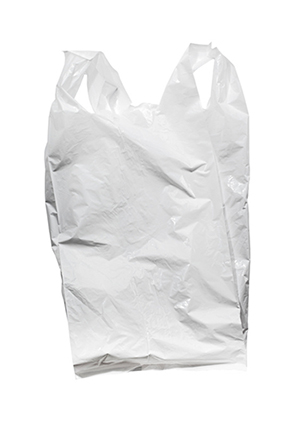The bag that carries fruit and conflicts

The controversial plastic bag is to get its own history. Researcher Nisse Johansson delves into the history of the plastic bag, which was invented by a KTH engineer and later criticised as an environmental villain. Now it has also become a political hot potato.
Nisse Johansson, a researcher in sustainable development at KTH, will recount the journey of the plastic carrier bag, which began in a basement in Norrköping, in a popular science book. A fairly unknown, but undeniably interesting Swedish background, he says.
“The plastic bag was invented by Curt Lindquist in the late 1950s, when he was experimenting with a new and exciting material: plastic,” says Johansson, who sees Lindquist, educated at KTH, as an example of one of many prominent Swedish civil engineers from the interwar period.
A few years earlier, he had put washing sponges through his wife's meat grinder. The result was the modern dishcloth.
Raise different questions
“On his wife's advice, it was named ‘Wettex’, from her combining the words ‘wet’ and ‘textiles’“.
The book about the plastic bag has a broad approach – from nature and consumption to waste and politics. Can it really cover so much?
“The interesting thing about the plastic bag is precisely how this inconspicuous everyday object, which consists only of a cheap material and is intended to carry other, more important objects, seems to raise a lot of different questions concerning the environment, nature, ethics, waste, consumption and politics”.
In the latest Swedish general election, the plastic bag tax was a politically explosive issue. The tax had been introduced the year before but was abolished in November 2024.
“Restrictions on plastic bags are a widespread environmental policy, with proud roots in economically marginalised countries in Africa, Asia and South America.

Sweden stands out as one of the very few countries that has withdrawn the tax”, Johansson says.
Responsible for waste
He thinks that the Swedish political debate was “a strange story”:
“There was talk of symbolic Green Party politics, even though the proposal came from the Liberals, with demands from the EU. But in the end, the short history of the plastic bag tax shows how difficult it is to regulate everyday objects, even something as insignificant as a plastic bag”.
What place do plastic bags and other plastic products have in a sustainable society, in your opinion?
“If we really care about plastic, which is, after all, a useful material, we shouldn't use plastic items only a few times before discarding them. Production needs to be reduced, and producers need to take responsibility for where the plastic ends up – both as microplastics and when it is incinerated and releases fossil carbon dioxide,” says Johansson, who hopes for international regulation:
“I am cautiously optimistic that a global plastics treaty can eventually be signed and actually make a difference”.
Text: Christer Gummeson ( gummeson@kth.se )

